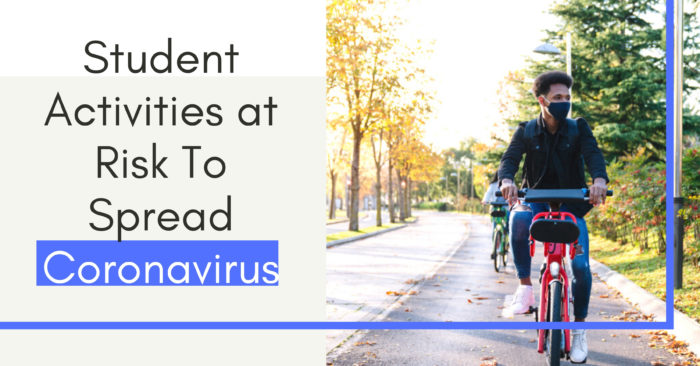Student Activities at Risk To Spread Coronavirus
The fatal and highly contagious disease has widespread all across the globe forcing several countries to impose complete lockdown. Half of the world’s population is jailed in their homes whereas public areas are deserted, and streets are emptied. Even after all the rigorous measures to pevent the virus, the cases continue to rise on an incremental toll every day. A question that may arise, if the lockdown doesn’t work as an effective measure to contain the COVID-19, why risk the lives of people living below the poverty thresholds, especially in developeing countries.
Daily wagers and small-scale businessmen are running out of cash for necessities and food, water and also shelter. This is forcing many people to think that it is quite mandatory to remove the lockdown and restart everything, taking precautions and safety measures. If this policy is applied, then it can lead to severe consequences. The only working measure against this novel COVID-19 is to practice social-distancing and observe quarantine. In a nutshell, it would be impossible to contain the virus, and the world will face a pandemic similar to the Black Death, which took lives of over 50 million people.
Having expounded on the importance of quarantine and severity of the SARS-COV2, it is now mandatory to shed light upon the main subject of this article.
Around the world, the new normal for the kids and teenagers is to stay up all night, take online classes (if any), watch Netflix, and play games. This is because schools and colleges, including universities, have been shut-down in almost every country. Alternatively, online classes have been introduced by educational administrations and yet they the online study sessions don’t seem to be an effective alternative for real-life classrooms – this is another topic and requires to be discussed on a separate tangent.
In a synoptic view, understanding the grave situation being faced by young adults is quite crucial. Campus administrations all around the world are evacuating students, libraries have become empty, and foreign students are filing repatriation to go to their home countries. On the other hand, many countries have not closed down any educational institution citing that they are taking preventive measures such as; not letting students sit closely and getting their hands sanitized every hour.
The parties, seminars and many other events that students enjoy in normal times have all been cancelled. All of the students’ activities are banned, and this can be psychologically devastating for their minds along with sheer deterioration in their academic studies and future careers.
Many universities around the globe have postponed the exams, while some of the universities are taking those exams online. Student activities pose a grave threat to the safety of thousands in every country. Find out more about what you can do protect yourself and others in this article.
Should I self-isolate?
The World Health Organisation (WHO) has reiterated that one must isolate themselves if they experience any symptoms related to SARS-COV2, and one of the most common symptoms is high fever. As the virus is highly contagious meaning even if you don’t experience any symptoms, the governments and health organisations advise practising social distancing (which means to stay at home) to not spread the highly contagious virus. Social distancing also implies that one should not meet family and friends, avoid going to public areas and remain quarantined until the situation alleviates. You can go out for a jog or a walk, but make sure to stay 2 meters apart from another individual.
Do universities have any helplines?
Most of the universities have amped up their student support services and other helplines. These measures are undertaken, which include teachers and students have to notify the administrators about how they are experiencing and doing social distancing, self-isolation, etc. they check-in regularly on their students, this keeps them connected to the educational institutions, and that helps surpass the times of uncertainty of COVID-19.
Should I go home?
Most of the university campuses are shut-down, and other university activities are halted or stalled. However, not many universities are asking their students to go home. Eventually, it all depends upon the students whether they want to stay home or stay in universities. All the facilities will still be available in schools and universities anyway.
How can I still study?
This dire and aggravated situation in itself is quite demotivating as such that it encourages students to not study and procrastinate. But many universities are taking extra precautionary measures by talking to exam boards and finding different creative ways so that students don’t lose on learning and have a goal in sight. Many ministries in educational sectors of governments around the world have stalled any face-to-face educational provision and encourage distance learning.
At the same time, facilities and administrations of universities are creating different videos and content for the students. Universities are conducting online skype or zoom sessions, but it is mostly ineffective because this new measure causes a lack of seriousness in students because of the distracted and vague teaching style. But somehow teachers and students are managing to work under these circumstances. Instructors also give online assignments to students which is why they are found surfing through the net who can write my assignment?, they often find credible and professional writing service help online.
How can I cope with anxiety?
Having strong mental health during the times of crises has utmost importance. If your mental health deteriorates, everything around you and the situation will further aggravate. Many universities, around the globe, have provided several facilities for students, including mental health facilities. In this, students can contact the university and talk to them about their problems and the university will make sure to facilitate them with whatever possible.
When will classes start again?
According to many studies, scientists have given no deadline about the creation of a vaccine that cures COVID-19. It is uncertain to give any final date of when the universities and schools might open again. Governments have not expounded upon the prospects of schools and universities opening – many schools have cancelled grade exams and promoted students in the next class. Universities are taking exams online – which could cause issues related to cheating. Many universities are also predicting final grades of the students’ exams by highlighting and following their coursework or precedent mock exams.
To conclude, it is mandatory to take precautionary measures for everyone, most importantly, young students of the millennial nation. As many recent studies have revealed that the young generation is asymptomatic to the COVID-19, which means they carry the virus without showing any symptoms, which makes them highly lethal in regards with the transmission of the disease with others. Some precautionary measures are mentioned below:
What to do?
- Wash hands frequently, at every hourly interval, wash them for 20 seconds. You can use soap or any alcohol-based wipes, or any sanitizer (inclusive of alcohol)
- You must cover your nose with a tissue or your elbow, whenever you sneeze as you can transmit the virus to anyone else – if you contain any.
- Distance yourself from others (1 meter or 4 feet) who are not well, or infused with any other diseases.
- Self-isolation is the sole measure, as of now, that works against the spreading of COVID-19. So, you must undertake it. Stay home as much as possible, go out only if necessary.
What not to do?
As the disease can be transmitted in your body via your eyes, nose, or mouth. So, avoid touching them, and disinfect your whole house by spraying with any alcohol-based spray in your house, as recent studies have revealed that the virus can remain on surfaces.
These tough times too shall pass. We’re in this together, so stay position and stay indoors to protect your’s and other’s lives.



